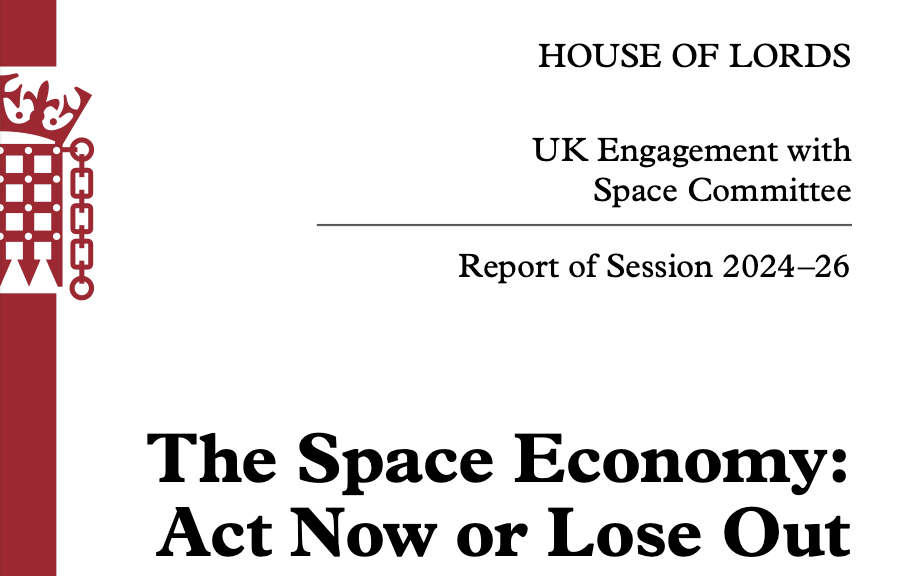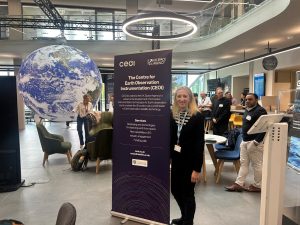A new House of Lords report appraising the space economy has highlighted the UK’s “strong heritage” in producing Earth observation satellites, and that further investment in this sector could be leveraged through new business and academia collaborations.
The UK Engagement with Space Committee’s new report, The Space Economy: Act Now or Lose Out, was published on November 4.
A committee of 12 peers were appointed to consider UK policies relating to space, and both the opportunities and challenges related to the UK’s engagement with space.
This latest report considers the difficulties facing the space sector and what action needs to be taken to stop the UK “seriously falling behind competitor states”.
The report acknowledges that Earth observation technology is a “vital part of climate science, urban design and the energy sector” and that the UK “is lauded for its expertise in Earth observation and satellite communications capability”.
While Earth observation (EO) is “recognised as a UK strength”, the report details some of the issues facing this sector, with the National Centre for Earth Observation stating: “it is not clear that the scientific and economic strength, impact and practical significance of EO is always well-recognised in government appraisal of the space sector.”
The committee recommends that further investment in EO should be facilitated jointly by UK Research and Innovation (UKRI) and government departments, by calling for proposals for Prosperity Partnerships between universities and UK space companies dedicated to EO, similar to the existing Prosperity Partnerships in the aerospace sector.
Prosperity Partnerships are business and academia collaborations, with the scheme helping to support private business investment in the UK research base.
The report highlights that the EO market is expected to grow very significantly, with a large part of the market being for climate-related services. It is estimated that EO data supports £100 billion (4.7%) of UK GDP.
The report concludes: “The UK has a strong heritage in the design and manufacture of Earth observation satellites, as well as a strong capability in the analysis of EO datasets that can positively impact the functioning of government programmes and also stimulate downstream economic activity.
“EO technology is essential in the analysis of climate change and also provides significant use cases in agriculture, disaster management, the maritime sector and national security.”
Dr Nicolas Lévêque, Director of the CEOI, said: “We welcome this report from the UK Engagement with Space Committee, which recognises the UK’s strength in the field of Earth observation. The recommendations around further investment opportunities and partnerships are particularly encouraging.”
The committee report made a series of recommendations for the space economy, including:
- Provide a coherent strategic direction with clear delivery plans
- Reform the UK’s space funding model to allow firms to grow and scale
- Focus on the development of multi-use technologies
- Address skills challenges within the space sector
- Adopt a strategic approach to international partnerships.
The reports states: “The value of space to modern society is underappreciated.
“The UK’s spending commitments on space are not commensurate with its ambitions in terms of both capability development and international leadership. Compared with peer states, the UK invests relatively little in its space sector, which will limit its ability to capitalise on the opportunities that emerge in years to come.
“Given the degree of state support that is traditionally required to achieve success in space, the UK risks seriously falling behind competitor states at current funding levels.”
Baroness Ashton, Chair of the UK Engagement with Space Committee, said: “Only the most strategic and forward-looking nations will capture the economic and scientific rewards of this new space age. With the right leadership, co-ordination, and investment, the UK can be there.
“Space is transforming the world and our report found much to be positive about. Britain should play a role in leading this transformation. If not, it risks being left behind.”
Another recent report, commissioned by the UK Space Agency, described how the Centre for Earth Observation Instrumentation (CEOI) is crucial to the UK maintaining its position at the forefront of Earth Observation expertise and capability.
The independent report evaluating the effectiveness of the CEOI programme says it is funding innovative projects that are leading to “enhanced technological progression and promising mission concepts”.
It confirms that the CEOI is playing a “crucial role” in ensuring the UK is “a significant player in global EO technology development” and suggests that increasing its funding could deliver further value to the UK’s EO capabilities.




